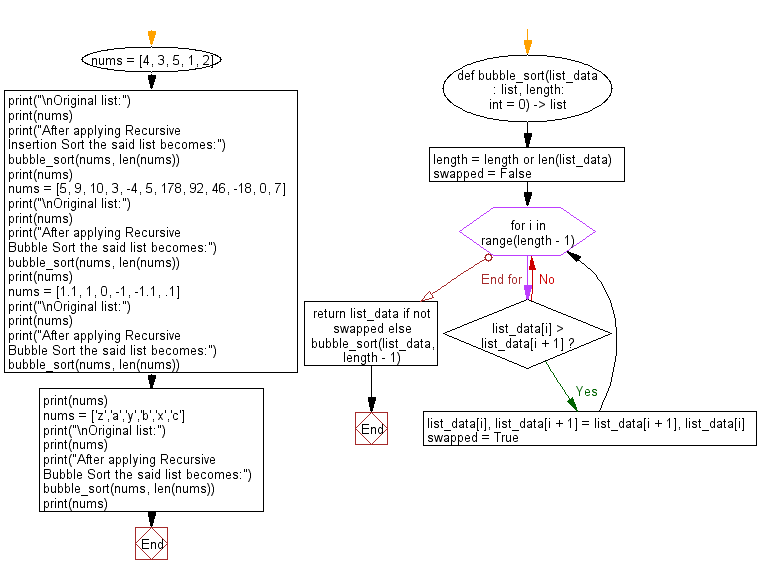Python: Sort unsorted numbers using Recursive Bubble Sort
30. Recursive Bubble Sort
Write a Python program to sort unsorted numbers using Recursive Bubble Sort.
Sample Solution:
Python Code:
#Ref.https://bit.ly/3oneU2l
def bubble_sort(list_data: list, length: int = 0) -> list:
length = length or len(list_data)
swapped = False
for i in range(length - 1):
if list_data[i] > list_data[i + 1]:
list_data[i], list_data[i + 1] = list_data[i + 1], list_data[i]
swapped = True
return list_data if not swapped else bubble_sort(list_data, length - 1)
nums = [4, 3, 5, 1, 2]
print("\nOriginal list:")
print(nums)
print("After applying Recursive Insertion Sort the said list becomes:")
bubble_sort(nums, len(nums))
print(nums)
nums = [5, 9, 10, 3, -4, 5, 178, 92, 46, -18, 0, 7]
print("\nOriginal list:")
print(nums)
print("After applying Recursive Bubble Sort the said list becomes:")
bubble_sort(nums, len(nums))
print(nums)
nums = [1.1, 1, 0, -1, -1.1, .1]
print("\nOriginal list:")
print(nums)
print("After applying Recursive Bubble Sort the said list becomes:")
bubble_sort(nums, len(nums))
print(nums)
nums = ['z','a','y','b','x','c']
print("\nOriginal list:")
print(nums)
print("After applying Recursive Bubble Sort the said list becomes:")
bubble_sort(nums, len(nums))
print(nums)
Sample Output:
Original list: [4, 3, 5, 1, 2] After applying Recursive Insertion Sort the said list becomes: [1, 2, 3, 4, 5] Original list: [5, 9, 10, 3, -4, 5, 178, 92, 46, -18, 0, 7] After applying Recursive Bubble Sort the said list becomes: [-18, -4, 0, 3, 5, 5, 7, 9, 10, 46, 92, 178] Original list: [1.1, 1, 0, -1, -1.1, 0.1] After applying Recursive Bubble Sort the said list becomes: [-1.1, -1, 0, 0.1, 1, 1.1] Original list: ['z', 'a', 'y', 'b', 'x', 'c'] After applying Recursive Bubble Sort the said list becomes: ['a', 'b', 'c', 'x', 'y', 'z']
Flowchart:

For more Practice: Solve these Related Problems:
- Write a Python program to implement bubble sort recursively and print the list after each full pass.
- Write a Python script to recursively bubble sort a list and count the number of swaps performed.
- Write a Python program to use recursive bubble sort to sort a list of strings and then verify the sorted order.
- Write a Python function to implement recursive bubble sort and compare its performance with the iterative version on small datasets.
Go to:
Previous: Write a Python program to sort a given collection of numbers and its length in ascending order using Recursive Insertion Sort.
Next: Write a Python program to sort unsorted numbers using Random Pivot Quick Sort. Picks the random index as the pivot.
Python Code Editor:
Contribute your code and comments through Disqus.
What is the difficulty level of this exercise?
Test your Programming skills with w3resource's quiz.
